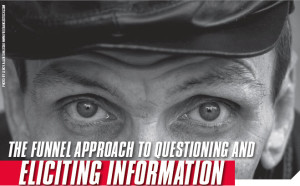 Written for Tactics and Preparedness, Issue 15, January 2015
Written for Tactics and Preparedness, Issue 15, January 2015
By Dr. David Matsumoto, Dr. Hyisung Hwang and Vincent Sandoval
Broadly speaking, elicitation refers to procedures or techniques involving interacting with and communicating with others, formally or informally, that is designed to gather knowledge or inform. Eliciting information from anyone who is uncooperative is a difficult task.
Elicitation can occur in many different contexts, including very impromptu, informal situations such as everyday conversations and social interactions (e.g., a “chance” meeting at a cocktail party or other social gatherings) or very formal ones that are scheduled and occur in a predefined place (e.g., a job interview).
In this article, we provide tips to eliciting information during relatively more formal interviews, which we define as an overt activity for the purpose of information gathering. That is, an interview is a conversation with a purpose.
A list of questions by itself does not constitute an interview. Instead, one should prepare for interviews by crafting relevant questions to address specific topics to explore with the subject prior to conducting an interview.
Preparation is essential to effective interviewing, including conducting and analyzing background reports, collating corroborating or disconfirming information, interviewing other individuals, gathering relevant forensics and other physical evidence.
Even when it comes to the interview, there are many things to consider, and it is important to understand the interview within the broader context than just the interaction between interviewer and subject.
Interviews occur in a certain place and time, between two or more individuals who often come from very different backgrounds, cultural perspectives and goals. Sometimes subjects (and interviewers) come to the interview with deep-seated hatred and disrespect for each other. In many instances subjects may be uncooperative or cooperative up to a point.
Interviews take place in a specific setting and much consideration needs to be paid to configuring those settings to maximize the effectiveness of the interview.
Effective interviewers rarely just jump straight to the point of the interview at the outset by asking very direct questions
about a very specific topic. Instead, effective interview strategies involve the development of some degree of rapport between the interviewer and subject.
The development and maintenance of rapport can be very tricky and demanding, especially with an initially uncooperative subject. Establishing rapport needs to be part of an effective interview strategy.
There are many different types of interview strategies and tactics. Below, we provide some broad-stroked tips based on our knowledge of the existing science relevant to interviewing as well as what has been vetted in the field with years of experience, which can be flexibly applied to a variety of settings.